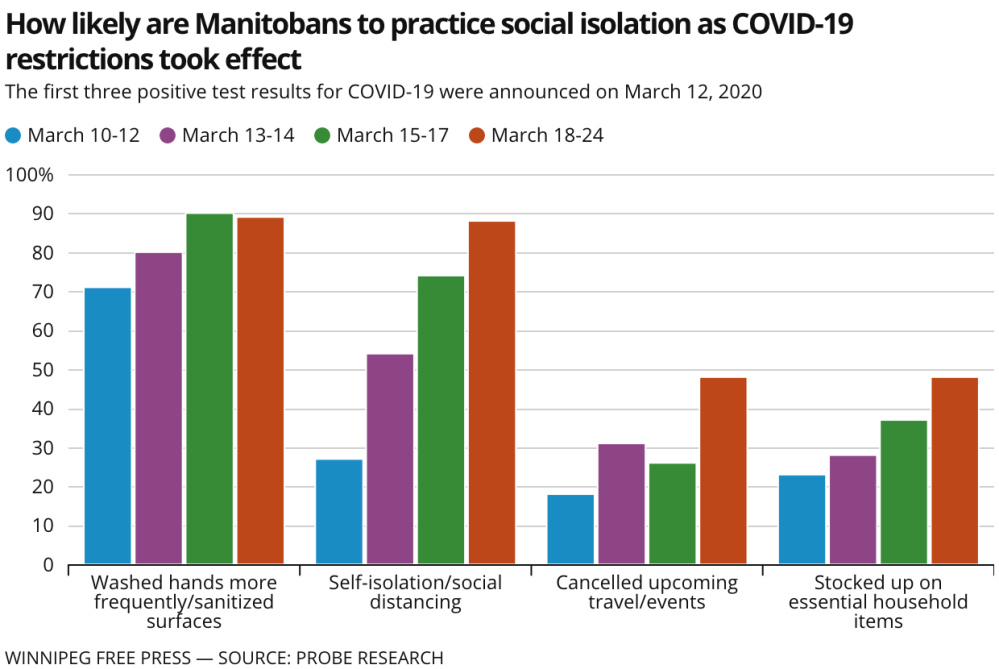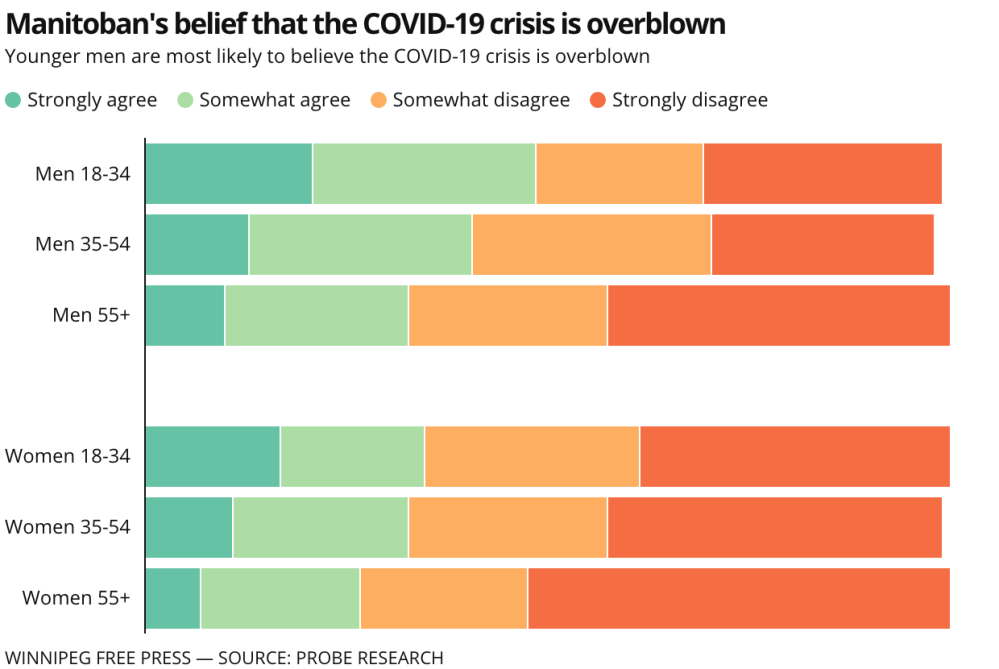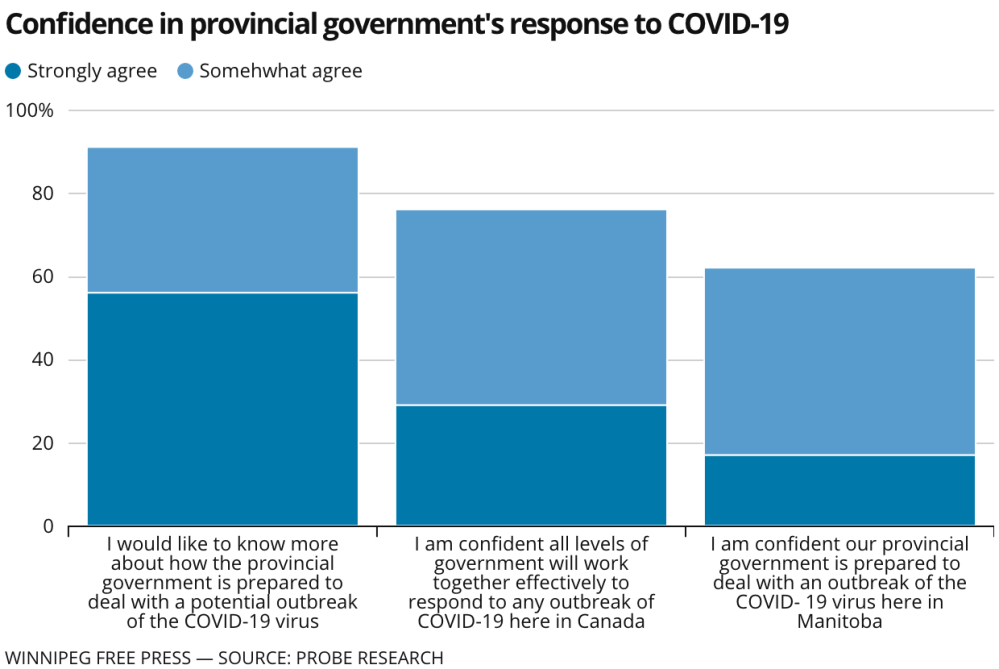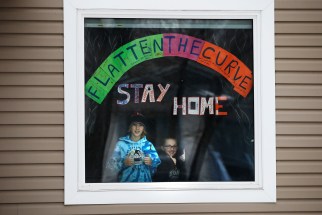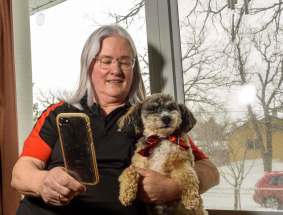Manitobans pick up pace on embracing COVID-19 directives: poll
Read this article for free:
or
Already have an account? Log in here »
To continue reading, please subscribe:
Monthly Digital Subscription
$0 for the first 4 weeks*
- Enjoy unlimited reading on winnipegfreepress.com
- Read the E-Edition, our digital replica newspaper
- Access News Break, our award-winning app
- Play interactive puzzles
*No charge for 4 weeks then price increases to the regular rate of $19.00 plus GST every four weeks. Offer available to new and qualified returning subscribers only. Cancel any time.
Monthly Digital Subscription
$4.75/week*
- Enjoy unlimited reading on winnipegfreepress.com
- Read the E-Edition, our digital replica newspaper
- Access News Break, our award-winning app
- Play interactive puzzles
*Billed as $19 plus GST every four weeks. Cancel any time.
To continue reading, please subscribe:
Add Free Press access to your Brandon Sun subscription for only an additional
$1 for the first 4 weeks*
*Your next subscription payment will increase by $1.00 and you will be charged $16.99 plus GST for four weeks. After four weeks, your payment will increase to $23.99 plus GST every four weeks.
Read unlimited articles for free today:
or
Already have an account? Log in here »
Hey there, time traveller!
This article was published 26/03/2020 (2089 days ago), so information in it may no longer be current.
Roughly one-third of Manitoba residents are resisting advice of public health officials to slow the spread of the novel coronavirus, according to a new poll focused on the COVID-19 pandemic.
Further, about one in 10 adult Manitobans have not changed their behaviour to include any social-distancing recommendations, including increased hand washing, physical distancing and isolation, and cancelling non-essential travel amid pandemic, according to data collected by Probe Research.
“Those are the people that the prime minister is talking to when he says ‘Enough is enough,’” Probe Research principal Mary Agnes Welch said Thursday, referencing remarks made this week by Prime Minister Justin Trudeau.
“Most of us are doing this properly. There is still a contingent among us who are a little late to this party and need to get serious about some of these prevention measures.”
The poll — part of a quarterly omnibus survey — ran March 10-24 and surveyed a random, representative sampling of 1,000 Manitobans.
In all, two-thirds (or 63 per cent) of respondents reported they are currently self-isolating, adhering to social-distancing recommendations and avoiding crowds.
However, the proportion of Manitobans buying into social-distancing recommendations steadily increased over time as public health messaging became more urgent and the number of COVID-19 cases in the province rose.“We could actually track some fairly significant changes in people’s habits and thoughts as the pandemic settled in and really got quite serious.”–Probe Research principal Mary Agnes Welch
Of those surveyed March 18-24, 88 per cent said they are now following social-distancing recommendations.
“We could actually track some fairly significant changes in people’s habits and thoughts as the pandemic settled in and really got quite serious,” Welch said.
The rapid change in behaviour can be attributed to directions from government and health officials, but social pressures likely influenced Manitobans as well, Welch said.
“I think there is a collective action that we’re all taking,” she said. “The flip side to that is you worry a little bit about that 12 per cent who still say that they’re not social distancing.”
Individuals across age and gender demographics have stepped up their hand washing (83 per cent), yet certain demographics reported less enthusiasm for pandemic precautions, including young men and those with fewer socioeconomic means.
Nearly half of male Manitobans aged 18 to 34 agreed the COVID-19 issue is “overblown” in Canada; by comparison, just 35 per cent of women in the same age bracket agreed.
Christopher Fries, an associate professor in the department of sociology at the University of Manitoba, said the poll results could be highlighting aspects of “social location,” and how gender, age, socioeconomic status, and ethnicity work together to affect how people respond to health information.
One research area that delves into social acceptability and risk taking as it pertains to health could explain different perceptions of a health crisis, Fries said.
“Research suggests that women are socialized to be more willing than men to admit they are sick and accept help for their health issues (social acceptability), whereas men are socialized to take health risks, while women are socialized to be cautious and concerned about taking care of health (risk taking),” Fries said by email.Christopher Fries, an associate professor in the department of sociology at the University of Manitoba, said the poll results could be highlighting aspects of “social location,” and how gender, age, socioeconomic status, and ethnicity work together to affect how people respond to health information.
“The basic idea is that our patriarchal and sexist culture teaches men and women to relate to their bodies and health in different ways. This, in turn, produces observed gender differences in health behaviour.”
According to Probe, 41 per cent of rural and northern Manitobans agreed the crisis was overblown (compared to 33 per cent in Winnipeg) — a sentiment echoed by those with lower education levels (53 per cent among those with a high school diploma or less) and 45 per cent of individuals with household incomes below $50,000.
“When it comes to people who are of lower socio-economic status, they have a lot of other things to worry about,” Welch said, “and they may not have access to this constant barrage of news that the rest of us do.”
On the subject of the province’s capacity to respond to an outbreak of the novel coronavirus in Manitoba, about two-thirds (62 per cent) expressed some level of confidence in the government.
Those living outside of Winnipeg and older than 55 were more confident in the provincial government, and an overwhelming number of respondents — 91 per cent — are seeking more information about how the government plans to handle an outbreak.
Manitobans are also bracing for loss, survey results showed, with more than 80 per cent of respondents saying they believe COVID-19 will end in the deaths of neighbours.
Probe Research said the survey has a 95 per cent certainty of results within 3.1 percentage points.
danielle.dasilva@freepress.mb.ca

Our newsroom depends on a growing audience of readers to power our journalism. If you are not a paid reader, please consider becoming a subscriber.
Our newsroom depends on its audience of readers to power our journalism. Thank you for your support.

